

The best AI tools for research papers and academic research (Literature review, grants, PDFs and more)
As our collective understanding and application of artificial intelligence (AI) continues to evolve, so too does the realm of academic research. Some people are scared by it while others are openly embracing the change.
Make no mistake, AI is here to stay!
Instead of tirelessly scrolling through hundreds of PDFs, a powerful AI tool comes to your rescue, summarizing key information in your research papers. Instead of manually combing through citations and conducting literature reviews, an AI research assistant proficiently handles these tasks.
These aren’t futuristic dreams, but today’s reality. Welcome to the transformative world of AI-powered research tools!
This blog post will dive deeper into these tools, providing a detailed review of how AI is revolutionizing academic research. We’ll look at the tools that can make your literature review process less tedious, your search for relevant papers more precise, and your overall research process more efficient and fruitful.
I know that I wish these were around during my time in academia. It can be quite confronting when trying to work out what ones you should and shouldn’t use. A new one seems to be coming out every day!
Here is everything you need to know about AI for academic research and the ones I have personally trialed on my YouTube channel.
My Top AI Tools for Researchers and Academics – Tested and Reviewed!
There are many different tools now available on the market but there are only a handful that are specifically designed with researchers and academics as their primary user.
These are my recommendations that’ll cover almost everything that you’ll want to do:
Want to find out all of the tools that you could use?
Here they are, below:
AI literature search and mapping – best AI tools for a literature review – elicit and more
Harnessing AI tools for literature reviews and mapping brings a new level of efficiency and precision to academic research. No longer do you have to spend hours looking in obscure research databases to find what you need!
AI-powered tools like Semantic Scholar and elicit.org use sophisticated search engines to quickly identify relevant papers.
They can mine key information from countless PDFs, drastically reducing research time. You can even search with semantic questions, rather than having to deal with key words etc.
With AI as your research assistant, you can navigate the vast sea of scientific research with ease, uncovering citations and focusing on academic writing. It’s a revolutionary way to take on literature reviews.
- Elicit – https://elicit.org
- Litmaps – https://www.litmaps.com
- Research rabbit – https://www.researchrabbit.ai/
- Connected Papers – https://www.connectedpapers.com/
- Supersymmetry.ai: https://www.supersymmetry.ai
- Semantic Scholar: https://www.semanticscholar.org
- Laser AI – https://laser.ai/
- Inciteful – https://inciteful.xyz/
- Scite – https://scite.ai/
- System – https://www.system.com
If you like AI tools you may want to check out this article:
- How to get ChatGPT to write an essay [The prompts you need]
AI-powered research tools and AI for academic research
AI research tools, like Concensus, offer immense benefits in scientific research. Here are the general AI-powered tools for academic research.
These AI-powered tools can efficiently summarize PDFs, extract key information, and perform AI-powered searches, and much more. Some are even working towards adding your own data base of files to ask questions from.
Tools like scite even analyze citations in depth, while AI models like ChatGPT elicit new perspectives.
The result? The research process, previously a grueling endeavor, becomes significantly streamlined, offering you time for deeper exploration and understanding. Say goodbye to traditional struggles, and hello to your new AI research assistant!
- Consensus – https://consensus.app/
- Iris AI – https://iris.ai/
- Research Buddy – https://researchbuddy.app/
- Mirror Think – https://mirrorthink.ai
AI for reading peer-reviewed papers easily
Using AI tools like Explain paper and Humata can significantly enhance your engagement with peer-reviewed papers. I always used to skip over the details of the papers because I had reached saturation point with the information coming in.
These AI-powered research tools provide succinct summaries, saving you from sifting through extensive PDFs – no more boring nights trying to figure out which papers are the most important ones for you to read!
They not only facilitate efficient literature reviews by presenting key information, but also find overlooked insights.
With AI, deciphering complex citations and accelerating research has never been easier.
- Aetherbrain – https://aetherbrain.ai
- Explain Paper – https://www.explainpaper.com
- Chat PDF – https://www.chatpdf.com
- Humata – https://www.humata.ai/
- Lateral AI – https://www.lateral.io/
- Paper Brain – https://www.paperbrain.study/
- Scholarcy – https://www.scholarcy.com/
- SciSpace Copilot – https://typeset.io/
- Unriddle – https://www.unriddle.ai/
- Sharly.ai – https://www.sharly.ai/
- Open Read – https://www.openread.academy
AI for scientific writing and research papers
In the ever-evolving realm of academic research, AI tools are increasingly taking center stage.
Enter Paper Wizard, Jenny.AI, and Wisio – these groundbreaking platforms are set to revolutionize the way we approach scientific writing.
Together, these AI tools are pioneering a new era of efficient, streamlined scientific writing.
- Jenny.AI – https://jenni.ai/ (20% off with code ANDY20)
- Yomu – https://www.yomu.ai
- Wisio – https://www.wisio.app
AI academic editing tools
In the realm of scientific writing and editing, artificial intelligence (AI) tools are making a world of difference, offering precision and efficiency like never before. Consider tools such as Paper Pal, Writefull, and Trinka.
Together, these tools usher in a new era of scientific writing, where AI is your dedicated partner in the quest for impeccable composition.
- PaperPal – https://paperpal.com/
- Writefull – https://www.writefull.com/
- Trinka – https://www.trinka.ai/
AI tools for grant writing
In the challenging realm of science grant writing, two innovative AI tools are making waves: Granted AI and Grantable.
These platforms are game-changers, leveraging the power of artificial intelligence to streamline and enhance the grant application process.
Granted AI, an intelligent tool, uses AI algorithms to simplify the process of finding, applying, and managing grants. Meanwhile, Grantable offers a platform that automates and organizes grant application processes, making it easier than ever to secure funding.
Together, these tools are transforming the way we approach grant writing, using the power of AI to turn a complex, often arduous task into a more manageable, efficient, and successful endeavor.
- Granted AI – https://grantedai.com/
- Grantable – https://grantable.co/
Best free AI research tools
There are many different tools online that are emerging for researchers to be able to streamline their research processes. There’s no need for convience to come at a massive cost and break the bank.
The best free ones at time of writing are:
- Elicit – https://elicit.org
- Connected Papers – https://www.connectedpapers.com/
- Litmaps – https://www.litmaps.com ( 10% off Pro subscription using the code “STAPLETON” )
- Consensus – https://consensus.app/
Wrapping up
The integration of artificial intelligence in the world of academic research is nothing short of revolutionary.
With the array of AI tools we’ve explored today – from research and mapping, literature review, peer-reviewed papers reading, scientific writing, to academic editing and grant writing – the landscape of research is significantly transformed.
The advantages that AI-powered research tools bring to the table – efficiency, precision, time saving, and a more streamlined process – cannot be overstated.
These AI research tools aren’t just about convenience; they are transforming the way we conduct and comprehend research.
They liberate researchers from the clutches of tedium and overwhelm, allowing for more space for deep exploration, innovative thinking, and in-depth comprehension.
Whether you’re an experienced academic researcher or a student just starting out, these tools provide indispensable aid in your research journey.
And with a suite of free AI tools also available, there is no reason to not explore and embrace this AI revolution in academic research.
We are on the precipice of a new era of academic research, one where AI and human ingenuity work in tandem for richer, more profound scientific exploration. The future of research is here, and it is smart, efficient, and AI-powered.
Before we get too excited however, let us remember that AI tools are meant to be our assistants, not our masters. As we engage with these advanced technologies, let’s not lose sight of the human intellect, intuition, and imagination that form the heart of all meaningful research. Happy researching!
Thank you to Ivan Aguilar – Ph.D. Student at SFU (Simon Fraser University), for starting this list for me!

Dr Andrew Stapleton has a Masters and PhD in Chemistry from the UK and Australia. He has many years of research experience and has worked as a Postdoctoral Fellow and Associate at a number of Universities. Although having secured funding for his own research, he left academia to help others with his YouTube channel all about the inner workings of academia and how to make it work for you.
Thank you for visiting Academia Insider.
We are here to help you navigate Academia as painlessly as possible. We are supported by our readers and by visiting you are helping us earn a small amount through ads and affiliate revenue - Thank you!

2024 © Academia Insider


10 Best AI Research Paper Writing Tools for 2024 and 2025
As we look ahead to end of 2024 and forward to 2025, AI tools are set to revolutionize research paper writing by offering powerful features to enhance structure, clarity, and originality. This article explores the top 10 AI writing assistants designed to simplify the research paper writing process for students and academics:
Research Rabbit
Semantic Scholar
Quick Comparison
These AI tools offer a range of features to enhance research paper writing, including literature review assistance, citation management, data analysis, plagiarism checking, and AI-powered writing assistance. By leveraging the power of AI, students and researchers can improve the quality and efficiency of their research paper writing process.
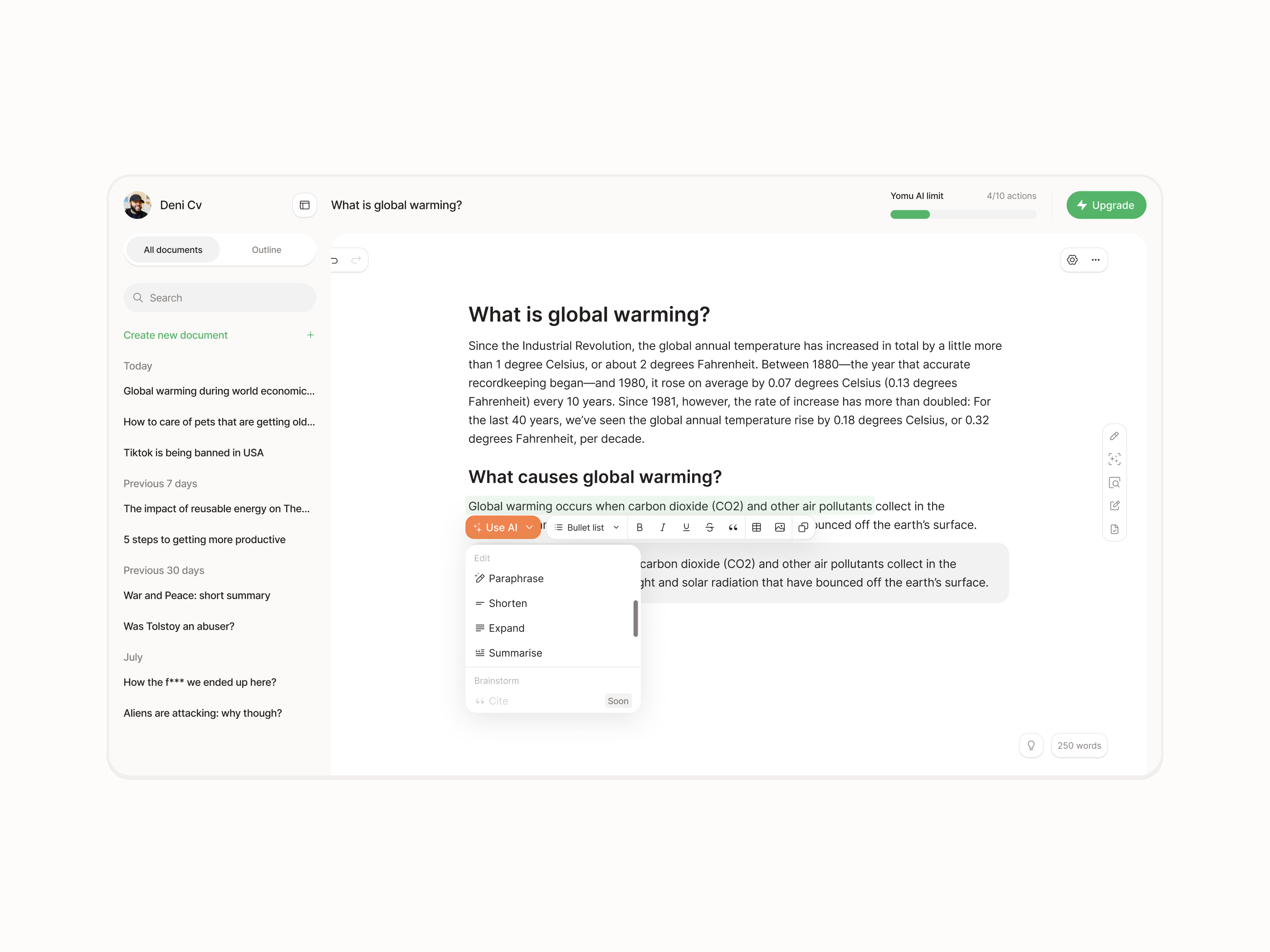
Key Features
Literature Review Assistance : Yomu AI helps researchers find relevant papers and summarize key findings, saving time in the initial research phase.
Citation Management : The tool automatically generates citations in various formats, ensuring accuracy and consistency throughout the paper.
AI Writing Assistant : Yomu AI can help generate paragraphs, suggest improvements, and even assist in structuring the paper according to academic standards.
Plagiarism Check : An integrated plagiarism checker ensures the originality of the work.
Data Analysis Support : While not a full-fledged data analysis tool, Yomu AI can assist in interpreting results and suggesting appropriate statistical methods.
Yomu AI significantly reduces the time spent on research paper writing while improving the overall quality of the work. Its user-friendly interface and comprehensive feature set make it an excellent choice for both novice and experienced researchers.
2. Scite.ai
Scite.ai is an AI-powered platform that revolutionizes the way researchers interact with scientific literature.
Smart Citations : Scite.ai provides context for citations, showing how the cited work has been referenced by other papers.
Literature Discovery : The tool helps researchers find relevant papers based on their current research interests.
Citation Validation : Scite.ai checks if citations actually support the claims made in the paper.
Scite.ai enhances the literature review process by providing deeper insights into the relevance and impact of cited works, leading to more robust and well-supported research papers.
3. Sourcely
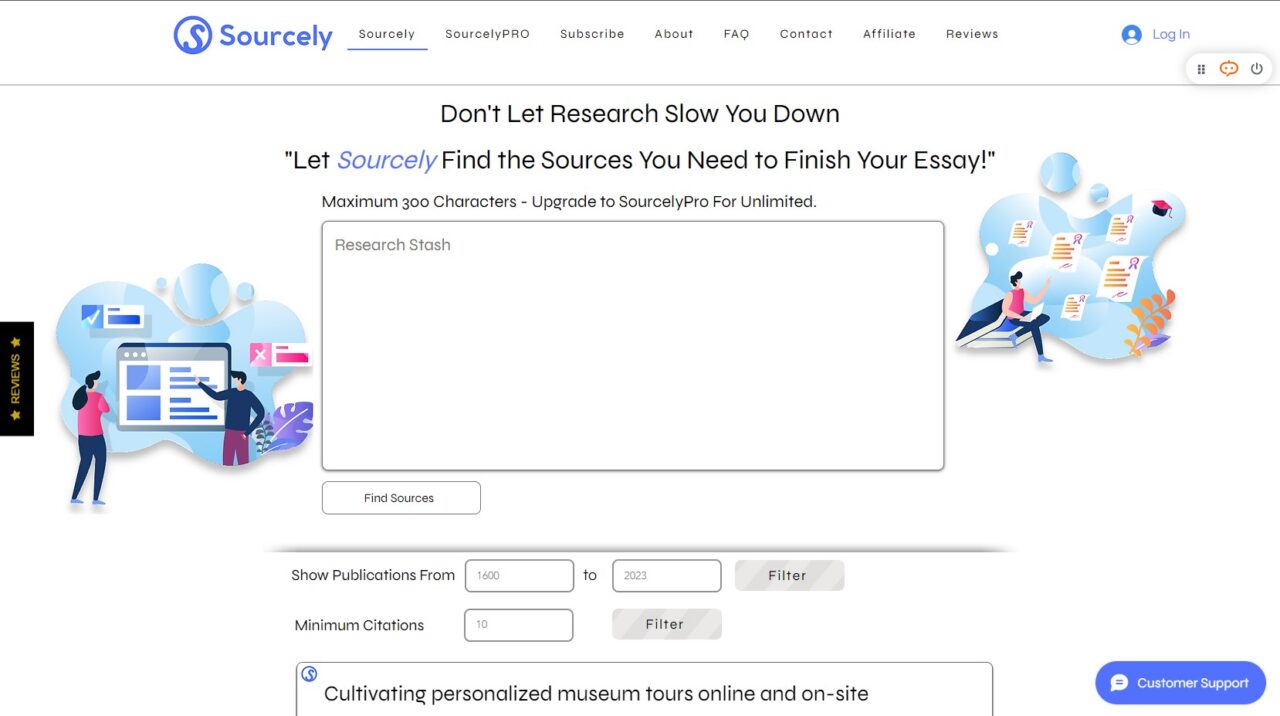
Sourcely.net is an AI-powered research assistant designed to streamline the academic research process and enhance source discovery.
Access to Vast Database : Sourcely.net provides access to over 200 million research papers, ensuring comprehensive coverage of various academic fields
Precise Search Filters : Users can refine their search results using advanced filters, including minimum citations, keywords, and article type
PDF Downloads : Sourcely.net allows users to easily download PDFs of research papers, facilitating offline reading and annotation
AI-Powered Recommendations : The platform uses artificial intelligence to understand research needs and deliver personalized source recommendations
Integration with Yomu AI : Sourcely.net seamlessly integrates with Yomu AI for real-time feedback and efficient writing tools.
Sourcely.net significantly enhances the research process by providing a user-friendly interface for discovering relevant sources, saving time, and improving the overall quality of academic work. Its AI-powered features and vast database make it an invaluable tool for students, researchers, and academics alike.
4. Research Rabbit
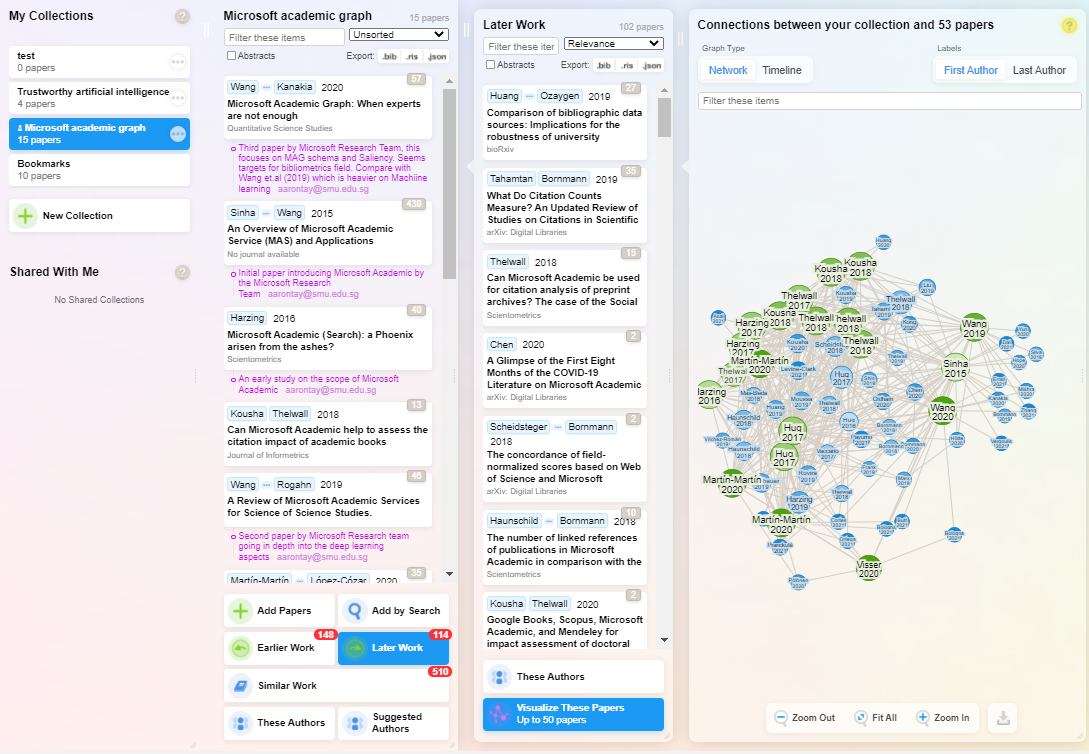
ResearchRabbit is an AI-powered literature mapping tool that helps researchers discover relevant papers and visualize connections between studies.
Literature Mapping : The tool creates visual maps of research papers, showing connections and relationships between studies.
Personalized Recommendations : ResearchRabbit suggests relevant papers based on the user's research interests.
Collaboration Features : Researchers can share collections and collaborate on literature reviews.
ResearchRabbit enhances the literature review process by providing a visual and intuitive way to explore research fields, leading to more comprehensive and well-connected research papers.
5. Writefull
Writefull is an AI-powered writing assistant specifically designed for academic and scientific writing.
Language Enhancement : Writefull provides suggestions to improve academic language usage and style.
Title and Abstract Generator : The tool can help generate compelling titles and abstracts for research papers.
Figure and Table Caption Suggestions : Writefull assists in creating clear and informative captions for figures and tables.
Writefull helps researchers improve the clarity and professionalism of their writing, ensuring that research papers meet high academic standards.
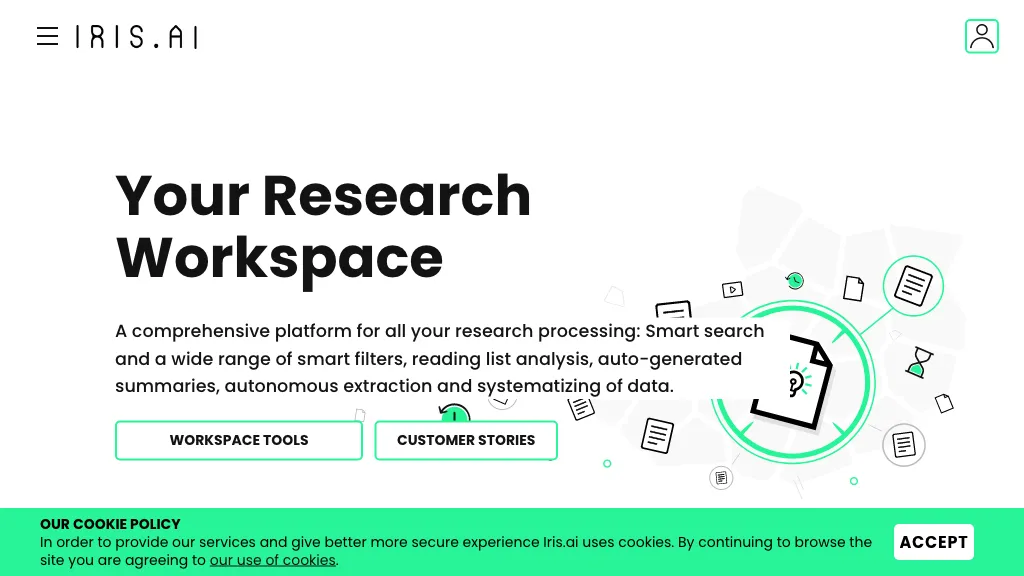
Iris.ai is an AI-powered research assistant that helps researchers navigate vast amounts of scientific literature.
Automated Literature Review : Iris.ai can analyze a research paper or project description and suggest relevant literature.
Concept Extraction : The tool identifies key concepts in scientific texts, aiding in understanding and summarization.
Research Map Generation : Iris.ai creates visual maps of research fields, helping researchers identify gaps and opportunities.
Iris.ai significantly speeds up the literature review process and helps researchers gain a broader understanding of their field, leading to more comprehensive and innovative research papers.
User Feedback and Academic Focus
Jenni AI is designed for students, researchers, and academics, with a user-friendly interface and academic focus. The tool offers flexible accessibility and pricing, making it an ideal solution for those seeking to elevate their writing skills and produce high-quality academic content.
Jenni AI's features and capabilities make it an excellent choice for those looking to improve their writing efficiency and quality. With its AI-powered language enhancement features and proofreading capabilities, Jenni AI is a valuable tool for academic writing.
7. Semantic Scholar
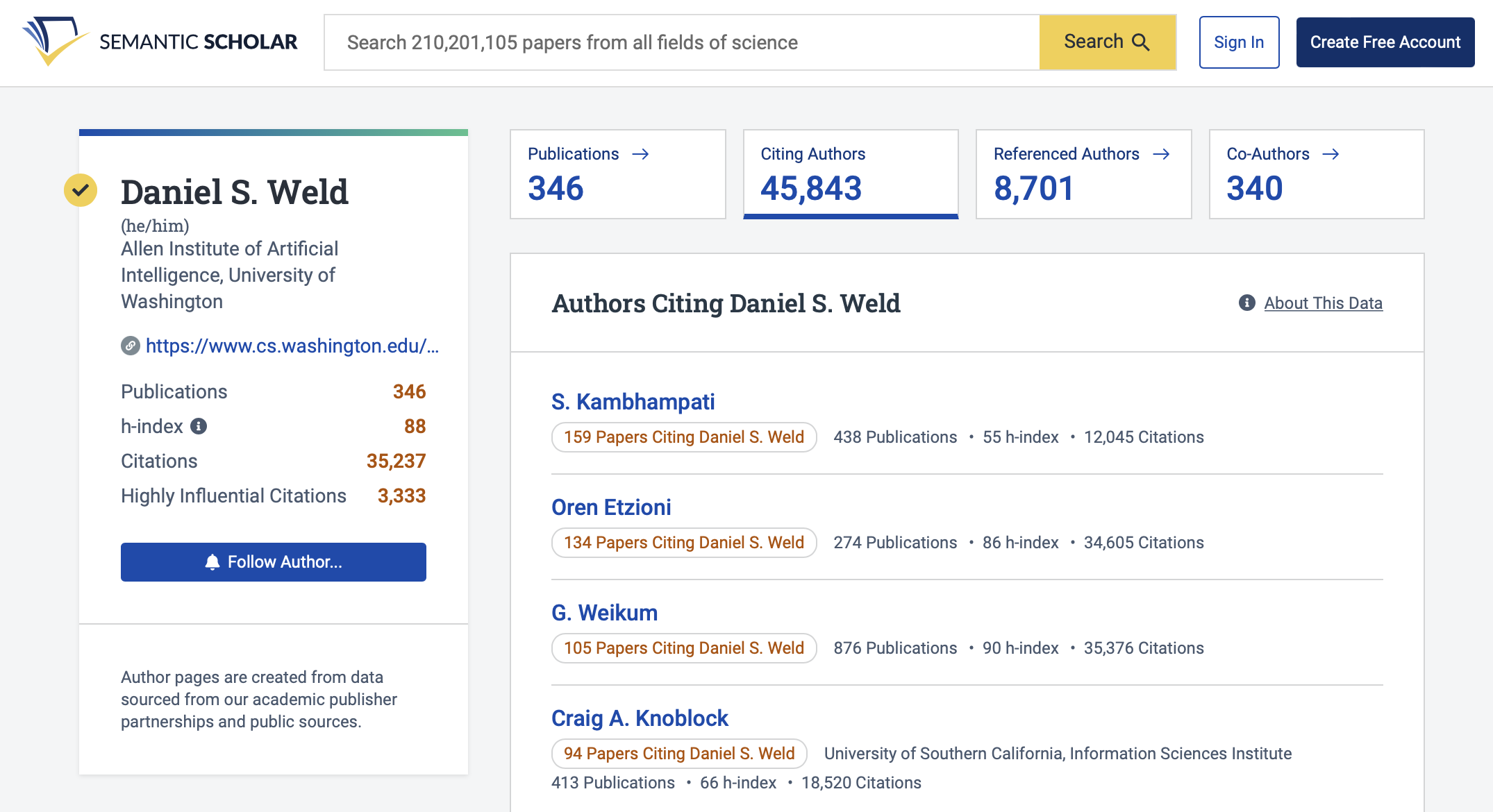
Semantic Scholar is an AI-powered research tool that helps researchers discover and understand scientific literature.
Intelligent Search : The tool uses AI to understand the meaning behind search queries, providing more relevant results.
Paper Summaries : Semantic Scholar generates concise summaries of research papers, highlighting key findings.
Citation Analysis : The tool provides insights into the impact and influence of papers based on citation data.
Semantic Scholar enhances the literature review process by providing more relevant search results and deeper insights into the impact of research papers.
sbb-itb-1831901
8. trinka ai.
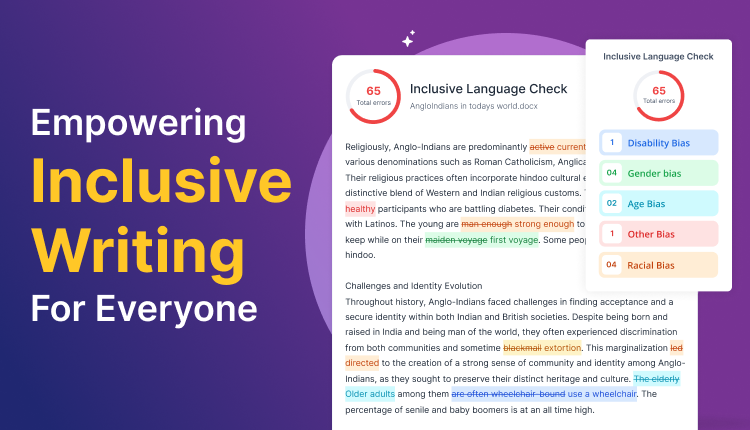
Trinka AI is an AI-powered writing assistant specifically designed for academic and technical writing.
Grammar and Style Checking : Trinka AI provides suggestions to improve grammar, punctuation, and academic writing style.
Discipline-Specific Suggestions : The tool offers writing suggestions tailored to specific academic disciplines.
Consistency Checker : Trinka AI ensures consistency in terminology and formatting throughout the paper.
Trinka AI helps researchers improve the clarity and professionalism of their writing, ensuring that research papers meet the specific requirements of their academic discipline.
9. PaperPal
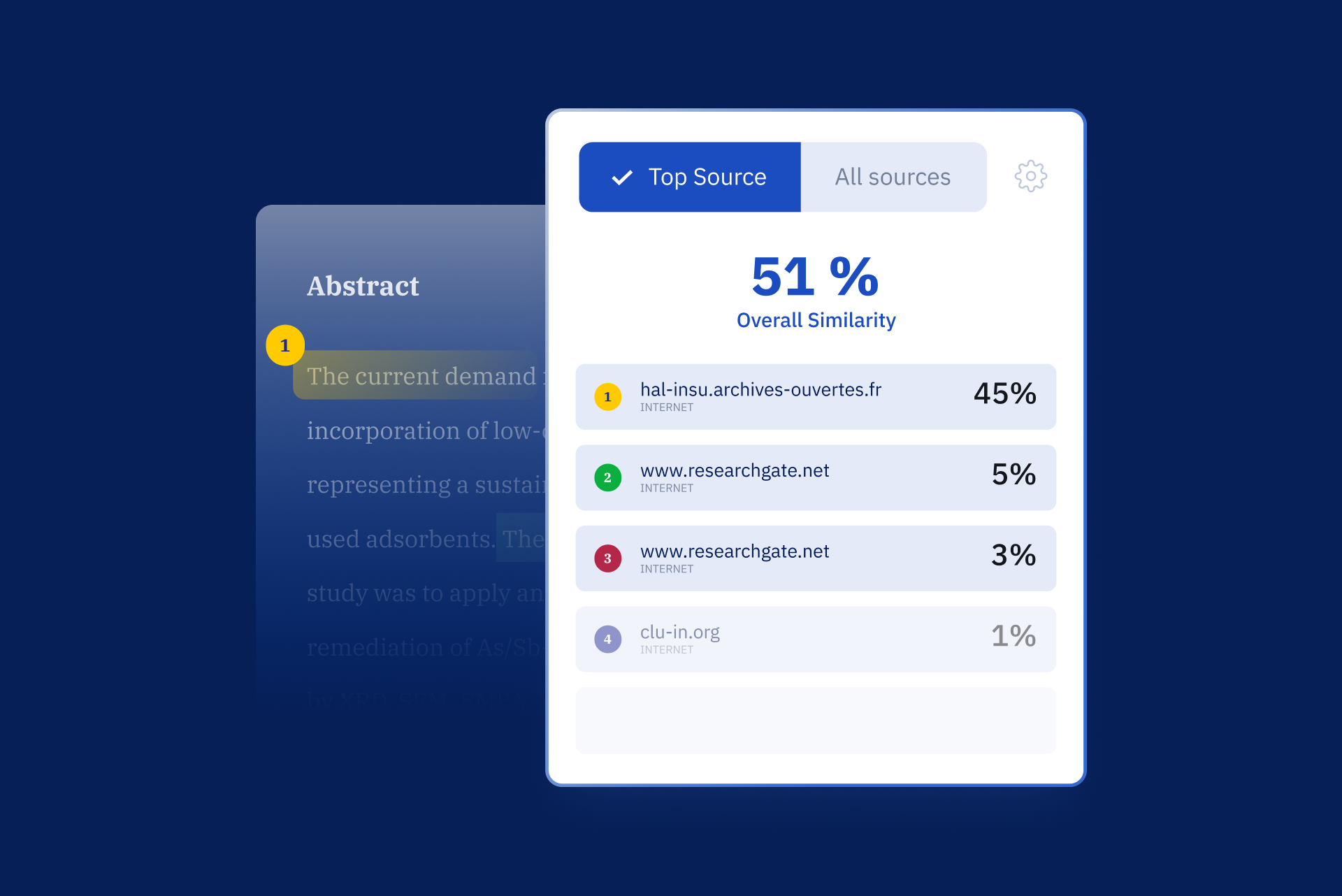
Paperpal is an AI-powered writing assistant designed to help researchers improve the quality of their manuscripts.
Language Polishing : Paperpal provides suggestions to enhance the clarity and fluency of academic writing.
Journal-Specific Formatting : The tool can format papers according to the requirements of specific journals.
Reference Checker : Paperpal ensures that all citations in the text have corresponding entries in the reference list.
Paperpal helps researchers prepare publication-ready manuscripts, increasing the chances of acceptance in academic journals.
10. Grammarly
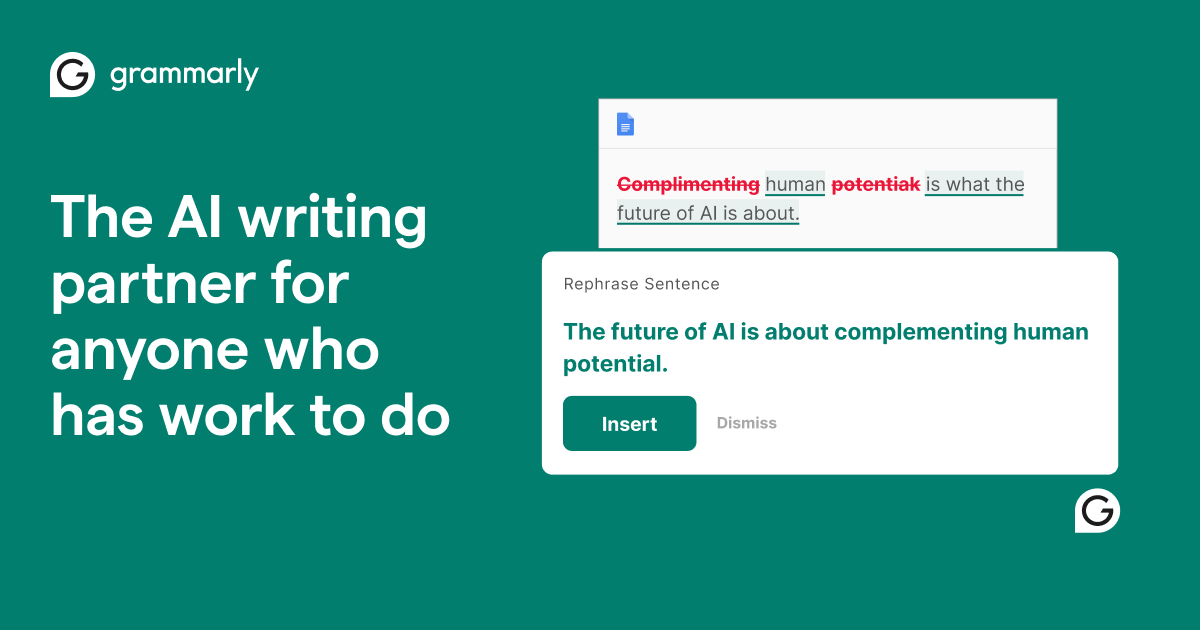
While not specifically designed for academic writing, Grammarly's AI-powered writing assistant can be a valuable tool for research paper writing.
Advanced Grammar Checking : Grammarly provides comprehensive grammar, spelling, and punctuation checks.
Style Suggestions : The tool offers suggestions to improve clarity and engagement in writing.
Plagiarism Checker : Grammarly includes a plagiarism checker to ensure the originality of the work.
Grammarly helps researchers improve the overall quality of their writing, ensuring that research papers are clear, engaging, and free of grammatical errors.
In conclusion, these AI-powered tools are set to transform the research paper writing process in 2024 and 2025. By leveraging these technologies, researchers can significantly improve the efficiency and quality of their work, leading to more impactful and successful research papers.
Related posts
- Boost Your Writing with AI: Discover the Best AI Essay Writers and Tools with Citations
- AI Writing Aid: Enhancing Academic Papers
- Leveraging AI for Enhanced Research Paper Writing
- Best Writing Assistant for Overcoming Writer's Block

Research Paper Writer
Ai-powered research paper writing tool.
- Academic Research: Write a research paper for your coursework, thesis, or dissertation.
- Professional Research: Create a well-structured report for your professional work, including market research, policy papers, or white papers.
- Personal Research: Draft a detailed essay on a topic of personal interest.
- Content Creation: Develop a long-form blog post or article based on in-depth research.
New & Trending Tools
Wedding toast generator, ai answer science questions, ai text analyzer and highlights.
10 Best AI Tools for Academic Research in 2024 (Free and Paid)
Ayush Chaturvedi
16 min read
What is the Best AI Tool for Academic Research?
Best ai tools for research at a glance, top 10 best ai tools for research, key features of elephas .
- Pricing: $8.99/month
Elepahs Customer Reviews
Chatgpt key features .
- Pricing: $20/month

ChatGPT Customer Reviews
Typeset.io features:.
- Pricing: $7.78/month
Typeset.io Reviews
Quillbot key features .
- Pricing: $4.17/month
Quillbot Customer Review
Wordvice.ai features:.
- Pricing: $9.95/month
- Wordvice.ai Reviews
Consensus AI Key Features
- Pricing: $8.99/month
Consensus AI Reviews
Scite.ai features , scite.ai customer reviews, scholarly key features.
- Pricing: $4.99/month
Scholarcy Customer Reviews
Proofhub key features .
- Pricing: $45/month
ProofHub Customer Reviews
Research rabbit key features .
- Pricing: Free Forever
Research Rabbit Reviews
What are research ai tools, 1. which ai is better for research, 2. is chatgpt good for research, 3. how can ai be used for research, how a professor used elephas in his lesson research process.
- Conclusion
In this post, we will explore the 10 best AI tools for academic research and:
- What are Research AI tools?
- What is the best AI tool for Academic Research?
- Is ChatGPT good for Research?
And so much more, let's get started.
Elephas is the best AI tool for academic research. It simplifies the process by summarizing complex papers, YouTube videos, and web pages and extracts key points effortlessly. With super-brain centralized knowledge organization and versatile content creation features, Elephas helps researchers and students achieve more in less time.
- Elephas: Summarize research, rewrite content in different styles, and organize summaries in a central "Super Brain" for easy access.
- ChatGPT: Summarize news articles and answer research questions
- Typeset.io: Streamline academic writing with templates and citation management.
- Quillbot: Rephrase text and summarize complex materials for research.
- Wordvice.ai : Ensure clarity, grammar, and originality in your academic writing.
- Consensus AI: Search vast databases and filter research papers for quality.
- Scite.ai: Get real citations and measure the credibility of research claims.
- Scholarcy: Summarize complex articles and build a searchable research library.
- ProofHub: Manage research projects with tasks, collaboration tools, and scheduling.
- ResearchRabbit: Build a research library and get recommendations for new papers.
1. Elephas

Elephas is an innovative AI tool designed to supercharge your research and writing efficiency. It utilizes advanced technology to break down complex research papers, YouTube videos, and other content, extracting the key points and saving you valuable time.
Additionally, Elephas goes beyond summarizing – it can seamlessly integrate with your workflow and rewrite content in various tones, making it a versatile companion for all your writing needs.
Elephas doesn't just summarize research papers; it extracts key points and integrates seamlessly with your workflow. Whether you're a student, researcher, or content creator, Elephas helps you achieve more in less time.
Effortless Summarization: Extract key points from research papers and YouTube videos with ease.
Centralized Hub: Keep all your research summaries organized in one place with Elephas Super Brain .
Seamless Content Creation: Create professional emails, engaging social media posts, and documents in just a few clicks.
Multiple Rewrite Modes: Choose from a variety of writing styles to make your content more engaging.
Super-Command Bar: Increase your productivity with features like article summarization and data extraction.
Pricing: $8.99/month
Users consider Elephas as a great AI companion, highlighting its usefulness for daily tasks and its reliable "brain" function. Also, users like its flexibility, especially the Super Brain function and local LLM integration. Elephas' integration with Keynote for quick presentations adds immense value. While the UI had past issues, recent updates have greatly improved it, making it a top choice for many.

Elephas is also one of the best AI Tools for Summarizing Research Papers in the market right now. And it bundles up with a powerful iOS app as well.
It works locally and it's 100% privacy-friendly!
If you own a Mac, you should definitely try it out.

ChatGPT, the tool behind the existence of many AI tools, is undeniably one of the best AI tools for research. With the right prompts, you can easily summarize any news articles , long notes, etc., in seconds. You can also ask ChatGPT research-related questions to gain a better understanding of research papers. Furthermore, you can improve your writing and avoid any grammar and punctuation mistakes. With the help of ChatGPT, the number of things you can do is endless.
Effortless Information Retrieval: Find the studies and data you need in a flash.
Smarter Literature Reviews: Get suggestions for key papers, authors, and research trends.
Idea Generation on Demand: Spark new research questions, hypotheses, and experiment designs.
Writing Assistant: Improve your writing with grammar checks, stylistic suggestions, and simplified explanations of complex concepts.
Pricing: $20/month
Some users like ChatGPT for its versatility, quick responses, and usefulness across various tasks. However, users highlighted issues with response accuracy, especially on complex topics. Some find responses insightful and valuable daily, while others express frustration with frequent inaccuracies.

3. Typeset.io

Typeset.io streamlines the entire academic writing process, saving you time and frustration. This user-friendly platform offers a variety of features to help you write, collaborate, and publish top-notch research. From predefined templates to AI-powered writing assistance, Typeset.io empowers researchers of all levels to achieve their scholarly goals.
Effortless Formatting: Predefined templates ensure your paper meets journal requirements.
Citation Breeze: Manage citations and references effortlessly, with automatic generation.
Seamless Collaboration: Work together on research papers in real time.
Smart Journal Selection: Find the perfect fit for your research with a built-in journal database.
Pricing: $7.78/month
Users mentioned that Typeset simplifies creating professional research reports with a variety of templates from well-known publishers and universities, saving users significant time. However, some others point out that formatting is limited, making it challenging to customize templates.

4. Quillbot

Quillbot is your AI research companion, offering several time-saving features to streamline your workflow. It is designed to assist researchers of all levels. This tool utilizes advanced learning algorithms to enhance your writing and comprehension skills. With Quillbot, you can confidently paraphrase text, summarize complex materials, and ensure clear, plagiarism-free writing. Additionally, you can perform citations with high accuracy. Quillbot streamlines your workflow and strengthens your writing.
Paraphrasing & Summarizing: Quillbot rewrites sentences and condenses lengthy passages, saving you time and effort.
Language Enhancement & Learning: Improve your writing with advanced suggestions and explanations, perfect for non-native speakers.
Research Brainstorming: Generate fresh ideas from just a few keywords, overcoming writer's block.
Academic Accuracy & Citation Help: Ensure your writing matches specific citation styles and uses precise academic language.
Pricing: $4.17/month
Some users reported that the quillbot provides basic spell-check features but lacks accuracy in plagiarism detection compared to Turnitin. When requesting refunds, users were allegedly threatened with account termination without compensation.

5. Wordvice.ai

Wordvice AI is one of the best AI tools for research, it is your one-stop shop for powerful writing assistance. This AI-powered tool uses cutting-edge technology to streamline your research workflow, saving you time and effort. From basic grammar and clarity checks to advanced plagiarism detection, Wordvice AI helps you to write with confidence and produce polished, original academic content.
All-in-one editing: Grammar, style, clarity, and fluency checks with real-time feedback.
Vocabulary booster: Get suggestions for synonyms and alternative phrasing to diversify your writing.
Academic writing companion: Ensures proper citation format, maintains a scholarly tone, and adheres to research conventions.
Originality assured: Scans millions of sources to prevent plagiarism in your work.
Pricing: $9.95/month
Wordvice.ai reviews .
Some users praised Wordvice for enhancing clarity and flow while preserving original intent, recommending it especially for graduate students. However, others were disappointed, mentioning edits that changed the original meaning and questioning the value, noting that friends could have done a comparable job.

6. Consensus AI

Consensus AI is an innovative platform that uses artificial intelligence to simplify your search process. In just minutes, Consensus AI can search through vast databases and deliver hundreds of relevant, high-quality research papers directly to you. Also, Consensus AI filters results by date, study type, and journal quality, ensuring you find high-quality, credible sources to strengthen your research.
AI-powered Search Engine: Enter your research question and let Consensus AI scour vast databases to find relevant papers.
Time-Saving Efficiency: Gather hundreds of papers in minutes, freeing you up to focus on analysis and writing.
Comprehensive Results: Access a diverse range of studies, including randomized trials, reviews, and observational studies.
High-Quality Papers: Filter results by journal quality to ensure the credibility of your sources.
Pricing: $8.99/month
We couldn't find any public reviews for the Consensus AI . Therefore, we advise users to proceed with caution.
7. Scite.ai

Scite.ai is one of the best for reliable research assistance powered by Artificial Intelligence. Scite.ai tackles a common problem with AI research tools – unreliable citations. Unlike others, Scite.ai provides you with real citations to published papers, so you can be confident in the information you use. Even better, Scite.ai can analyze the research and tell you how many studies support or challenge a specific claim.
Create Dashboards: Organize your research findings in a user-friendly format.
Journal and Institution Metrics: Gain insights into the reputation of academic sources.
Interactive Visualizations: You can see research trends and connections come through visualizations of the tool.
Measure Claim Credibility: Scite.ai analyzes the strength of a claim by showing you how many studies support or refute it.
Some users appreciate Scite for its value in verifying references and its effective visual tool for literature searches, especially helpful for academic researchers. However, others report significant issues with billing, such as unexpected charges and difficulties in canceling subscriptions.

8. Scholarcy

Scholarcy is an AI-powered tool that acts like a personal research assistant, summarizing complex articles, reports, and even book chapters for you. Scholarcy quickly helps you understand the key points of any document and assess its relevance to your work, saving you precious time and effort. Whether you're a researcher, student, or just curious about the latest advancements, Scholarcy helps you quickly grasp key findings and identify relevant sources
Key Points at a Glance: Scholarcy extracts crucial information and organizes it into clear categories, making it easy to grasp the main ideas.
Seamless Integration: Scholarcy offers handy Chrome and Edge browser extensions, allowing you to summarize research directly from your web browser.
Visual Aids: Scholarcy can extract figures, tables, and images from articles, providing a more comprehensive understanding of the research.
Organized Knowledge: Build your searchable database of summarized research, making it easy to revisit key information later.
Pricing: $4.99/month
Some users highly recommend this app for students, praising its ability to summarize large texts into organized sections and noting responsive support. They find it increasingly useful witConh recent updates. However, others report dissatisfaction, describing the summaries as mere copied sections rather than true AI outputs, alongside glitches, and advise against paying for the service due to quality issues.

9. ProofHub

ProofHub is one of the best AI tools for research to streamline research projects. It's an all-in-one project management tool designed specifically to make research teams more efficient and effective. ProofHub centralizes everything your team needs in a single platform, allowing seamless collaboration and communication. Save valuable time and avoid confusion by ditching the scattered emails, documents, and endless meetings.
Effortless Task & Project Management: Organize your research projects with ease using powerful tools like Kanban boards and Gantt charts.
Centralized Hub for Collaboration: Keep your team on the same page with a central platform for file sharing, discussions, and real-time feedback.
Streamlined Time Tracking & Scheduling: Never miss a deadline again! ProofHub's time tracking and scheduling features help you stay on top of your research project's progress.
Automated Workflows: Save even more time by automating repetitive tasks and creating custom workflows perfectly suited to your research needs.
Pricing: $45/month
Some users appreciate ProofHub's intuitive interface, which makes project management smoother than that of Google Sheets. However, others report issues with frequent server downtime, unreliable task-loading, and lack of effective support communication, causing significant workflow disruptions.

10. Research Rabbit

ResearchRabbit is another best AI tools for research, it helps you navigate through the vast world of scientific literature. Nicknamed the "Spotify for Papers," this innovative tool lets you explore research like never before. Build collections of articles you find interesting, and ResearchRabbit will cleverly suggest new papers that align with your specific interests. No more endless searches – ResearchRabbit becomes your personalized research assistant, saving you time and frustration.
Build your research library: Collect and organize articles you find interesting, all in one place.
Smart recommendations: Never miss a groundbreaking study! ResearchRabbit suggests new papers based on your interests, saving you valuable time.
Visualize connections: See how different research areas, authors, and ideas are linked together.
Collaboration made easy: Share your research collections with colleagues to work together more effectively.
Pricing: Free Forever
We couldn't find any public reviews for the Research Rabbit. Therefore, we advise users to proceed with caution.
In recent years, research has changed dramatically with modern AI tools. There are many AI tools that make research easier and more efficient while maintaining high academic standards. The best AI tools for academic research have become essential companions for scholars worldwide.
Let's see some benefits of research AI tools.
- Smart literature review tools scan countless papers in seconds, helping find important research quickly
- AI-powered citation tools keep track of references and fix formatting automatically
- Language processing tools can break down complex papers into easier-to-understand summaries
- Researchers can use AI tools to handle large amounts of data without spending hours on manual work such as Elephas.
Factors to Consider when Choosing the Best AI Tools for Research
There are different AI tools present on the internet for different needs. So with many tools, selecting the most suitable tool can be problematic.
Here are some k ey factors to consider
Your Research Needs: Now, what type of tasks are you going to perform with the tool? Is it for summarizing, web research, or anything else?
Data Accuracy and Credibility: Make sure the tool retrieves information from reliable sources so you don't have to spend time citing the sources manually.
Ease of Use: Consider the platform's user-friendliness. Look for intuitive interfaces and clear instructions.
Cost: AI tools often have varying pricing structures. Some offer free trials or basic plans, while others require subscriptions.
- Collaboration: Check if the tool has any collaboration features that allow seamless sharing and team research capabilities.
Most importantly, remember that AI research assistants are only there to increase your productivity in the research process, not to replace it .
Limitations of AI Tools for Research
Many of the best AI tools for research suit different types of people, and these tools have streamlined tasks and uncovered connections. However, they still have many limitations compared to manual research processes.
Here's a closer look at the limitations of AI Research Tools.
1. Accuracy and Bias: AI tools rely on the data they're trained on. If the data is biased or inaccurate, the results can be misleading. It's crucial to critically evaluate AI outputs and not rely solely on them.
2. Depth vs. Breadth: AI tools can efficiently scan vast amounts of literature, but they may miss nuances or subtleties within research papers. In-depth analysis and critical thinking remain essential for a comprehensive understanding.
3. Overreliance on Automation: AI shouldn't replace the core research process. Researchers should use AI to streamline tasks, not eliminate critical steps like evaluating source credibility and understanding research context.
4. Black Box Problem: Sometimes, AI won't explain its reasoning behind results. This lack of transparency can make it difficult to assess the trustworthiness of findings or suggestions.
5. Limited Scope: AI tools might not cover all relevant sources, especially niche or emerging research areas. Supplement your search with traditional methods like library databases and expert consultations.
Elephas is the best AI tool for research, offering key features for researchers such as summarizing research papers, articles, and YouTube videos. Additionally, you can upload data to a "super brain" for retrieval and chat with uploaded PDFs for deeper understanding. This makes Elephas a strong AI tool for research tasks
Yes, ChatGPT can be a helpful tool for initial research exploration. It can brainstorm ideas, summarize complex topics, and even find relevant sources. However, for in-depth research, specialized academic databases and citation tools are better suited.
AI can be used for summarizing complex information and content creation. AI tools can analyze research papers, articles, and even videos to extract key findings, saving researchers time and effort. AI can also rewrite content in different tones, making it a valuable asset for researchers who need to communicate their findings to various audiences.
In our community, we have found Elephas being used by some professors at a university, and they have shared their experiences on how they used it in their lesson research process.
Here's how he made the most of Elephas:
- He used Elephas to create quick summaries of textbooks and research papers, helping him understand key findings without spending hours reading
- When exploring video lectures for additional insights, Elephas helped by pulling out important points from long YouTube videos, making it easier to include this information in his lessons
- The professor organized all his research in Elephas Super Brain, creating a simple hub where he could find everything quickly. He also used the Super Brain chat feature to better understand his lesson materials.
- More importantly, with the help of the Web search feature, Record notes feature and content features of Elephas, he mentioned that he was able to create lecture notes more engaging and much faster.
Because of Using Elephas, he was able to
- Get more done in less time.
- Get a deeper understanding of the lesson.
- Create better and more engaging lectures.

But don't take our word on Elephas, give it a quick try. We have a free version you can try out to know if it fits into your routine or not.
Conclusion
When it comes to the best AI tools for making your research easier in 2024, Elephas is the clear winner.
If you're having a hard time choosing from the many options out there, Elephas is your safest choice. It works well with your research, whether you're reading difficult papers, understanding videos, or writing your own content.
There are a couple of times when you might want to look at other tools instead, such as when you are looking for something very specific.
Like keeping track of where information comes from, you might want to try Wordvice.ai or Typeset.io for those tasks.
Of course, every researcher is different.
Think about trying the free versions of different tools on our list, like Elephas' free option.
You might find one that works perfectly with how you like to research, what you need, or the specific things you study.
Mac Productivity
AI assistant
Personal Knowledge Management
Sign up now
Get a deep dive into the most important AI story of the week. Deliverd to your inbox for free!
Meet Elephas - Your AI-Powered Knowledge Assistant. Your Personal ChatGPT for all your files. Transform information overload into actionable insights. Organize vast knowledge. Access ideas efortlessly. Save 10 hours a week
You may also want to read

Elephas Review: Is it the Best AI Knowledge Assistant?
Pinned Post
User Stories

The $1000 AI Butler: Apple's Smart Display Makes Your Home Think for Itself

The Future of AI Under Trump's Presidency: A Dramatic Shift in Regulation and Policy
Previous Post

IMAGES
VIDEO
COMMENTS
Let's explore these tools in detail! 1. SciSpace Literature Review. SciSpace’s Literature Review tool is designed for researchers to conduct systematic literature reviews efficiently. This AI research ChatPDF tool helps you compare and contrast scientific papers, and extract key information, themes, patterns, and concepts of numerous research ...
AI for scientific writing and research papers. In the ever-evolving realm of academic research, AI tools are increasingly taking center stage. Enter Paper Wizard, Jenny.AI, and Wisio – these groundbreaking platforms are set to revolutionize the way we approach scientific writing.
As we look ahead to end of 2024 and forward to 2025, AI tools are set to revolutionize research paper writing by offering powerful features to enhance structure, clarity, and originality. This article explores the top 10 AI writing assistants designed to simplify the research paper writing process for students and academics: Yomu AI. Scite.ai ...
The Research Paper Writer uses advanced AI models to analyze your provided topic, thesis statement, and key points. It then structures a research paper with an introduction, body, and conclusion. The AI uses the `Search` function to find reliable sources to support your arguments. It ensures the paper is written in an academic style, with clear ...
Now that we understand what a research paper entails, let’s explore how AI tools can assist in creating a well-rounded and high-quality paper. Top 10 AI Tools for Creating Research Papers. AI tools have significantly enhanced the research and writing process by offering various capabilities that save time and improve accuracy.
2. ChatGPT. ChatGPT, the tool behind the existence of many AI tools, is undeniably one of the best AI tools for research. With the right prompts, you can easily summarize any news articles, long notes, etc., in seconds. You can also ask ChatGPT research-related questions to gain a better understanding of research papers.